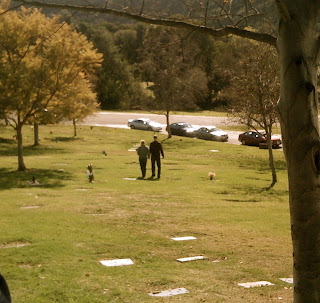The only other part of him that moved was his chest, which filled up with air often enough to look uncomfortable. His chest pressed upward a teal blanket, which hid his gaunt frame, in a struggle to breathe. The oxygen machine behind his bed seemed to breathe more easily, sucking air in with a sound like muted cymbals and pushing it out with a thud like a bass drum.
It was one of the first things I heard when I came in the room, where my sister had been sitting singing hymns, apologizing for not getting know him better. His trumpet sat, not played for years, on a shelf above the bed.
I can’t say I knew my grandfather as well as I would have liked. When I was younger, around the time little boys become fixated on violence and war, I asked for accounts of his World War II tours, where he worked a radio. He shot at fewer people than I would have liked, but I was still proud to have a grandfather in such a famous war.
He made my cousins and me things out of wood, such as rabbits that were puzzles, too. I liked that stuff, and tried my hand at it. I made a cow out of his scraps, because they fit together that way and I didn’t have to wait for anyone to help me cut the wood.
He was never quite willing to let go of all the woodworking tools he owned, even after a couple of strokes and a fall that left him unable to get around the house on his own, let alone operate saws. But to him, there was always the possibility that he’d pick them up again.
He wouldn’t let go of some of his musical instruments, either. He was a musician, a trumpeter and a band director for much of his professional life. I remember sitting on park lawns while he played with community symphonies.
In the retirement home, where he was on hospice care, he may have been thinking about when he could move on his own. He may have been thinking about getting out of this world, moving on to the next. With his head cocked to one side, hair streaked, staring blankly near the top of the curtains in a room shared with my grandmother, he may not have been thinking anything at all.
My family congregated in the room. We usually come together like this at Christmas or Thanksgiving. But this time most cried openly.
My grandma left her walker to lean over the bed and kiss him on the cheek, seemingly made more mobile to comfort him. She told him he was going to a better place, and she told me how they never really had any major problems in more than 60 years of marriage.
She told me months earlier that it felt like she had already lost him. He couldn’t talk much, or eat on his own. She was alone, she said.
I spend a lot of my time thinking about what I’m going to do with the rest of my life. What my career path will be. When I’m going to get married – I feel lucky to know to whom it will be, and that she was in the room with me. My grandparents worried about those things once, but now it’s done. The journey of their lives together is over. There’s no dreaming of what it can be, only the reality of what it was. But they lived well. They raised a good family, with three daughters they can be proud of, who, in some cases, followed in their footsteps as teachers and musicians.
I placed myself in his gaze, for the first time all night, and placed my hand on his shoulder. I hoped no one could hear me, I didn’t want it to be a show, thanked him and said goodbye. I tried to act like I wasn’t crying.
The next day, my mom called.
“Grandma thinks he’s gone,” she cried. He was.
“He’s happy again,” my mom said through tears. “He hasn’t been happy for a long time.”
I hope he can play his trumpet again.


